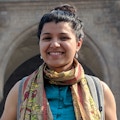Abhilasha Joshi, D. Phil.
Howard Hughes Medical Institute Life Sciences Research Foundation fellow, University of California, San Francisco
Abhilasha Joshi is a Howard Hughes Medical Institute Life Sciences Research Foundation fellow. She is currently pursuing her postdoctoral research in Loren Frank’s lab at the University of California, San Francisco (UCSF). Abhilasha completed her bachelor’s and master’s degrees in biology at the Indian Institute of Science Education and Research, Mohali, supported by the Kishore Vaigyanik Protsahan Yojana scholarship. She then earned her doctorate with Peter Somogyi and David Dupret at the University of Oxford as a Felix fellow. In her graduate work, she discovered the cellular, synaptic and physiological properties of a specialized group of long-range projection neurons that coordinate rhythmic oscillatory activity in the hippocampus, a brain region critical for learning and memory. At the end of her doctorate, Abhilasha won a seed grant from the European Institute of Technology (EIT) Health initiative to develop her idea of monitoring a potential coupling between hippocampal rhythmic oscillations and locomotor stepping rhythm in mice. In her current research at UCSF, she is investigating the synchronization between spatial representations in the hippocampus and ongoing locomotor stepping rhythm in rats.
Research Plan
“Rapid synchronization between internal cognitive representations and the stepping rhythm”
As animals move in complex environments, higher-order cognitive computations in the hippocampus reflect an internal map of the external world. This map is represented by the firing of neurons rhythmically at ~8 Hz and corresponds to sequential spatial representations at, behind or ahead of the actual location of the animal. In my postdoctoral work at UCSF, I discovered a precisely timed synchronization between hippocampal spatial representations and footfalls of rats as they approached upcoming spatial decisions. These results demonstrate the existence of a previously unknown coupling between central cognitive representations and peripheral motor processes that synchronize the two on a timescale of tens of milliseconds. My proposed research plan for the Simons Collaboration on Plasticity and the Aging Brain builds on these findings to do the following: (1) investigate the fundamental limits and dynamics of this synchronization with increasing cognitive and motoric challenges; (2) evaluate how widespread this coupling is across cortical and subcortical circuits; and (3) use this detailed information as a biomarker of the coherent function of the nervous system in young and aged animals. The future goals of my research program are to develop cognitive-motor-training-based protocols with the goal of promoting healthy aging.